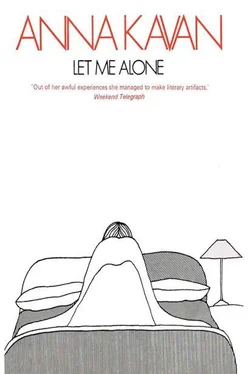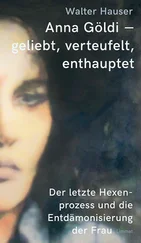‘Shall we ever meet again, do you think?’ asked Catherine.
‘Come out East and pay me a visit,’ Anna answered, with a mocking smile of faint irritation.
‘Perhaps I will,’ said Catherine. She smiled a very different, slow smile of latent purpose.
Anna was surprised.
‘Do you mean that?’ she asked.
‘Why not? New worlds to conquer —’ a slow, hidden significance was in Catherine’s tone. She smiled at Anna slightly, her eyes darkly dilated with some unknown intention, watching her steadily, her face seeming secretly to smile.
‘I shall invite you,’ said Anna, going to the door.
‘I shall come. Good-bye!’ said Catherine, and without moving her eyes, she sat motionless, till Anna was outside and the door closed behind her.
Anna walked quickly through the cold streets. She wanted to get away as soon as possible. She did not belong here. The interlude had been stimulating, but now it was finished. Ordinary life was beginning again — it must not catch her loitering. She was rather glad to be leaving Catherine. She knew that Catherine was pulling her in some way, establishing some sort of claim upon her which she was not prepared to admit. Catherine’s intimacy was dangerous, and Anna was glad to escape.
She walked towards the station, and all at once saw a vaguely familiar figure approaching. It was Drummond, the publisher, with a book under his arm. She hurriedly glanced round to see if there was any chance of avoiding him. There was not. Drummond was a well-built, energetic young fellow. He had seen her already, and came striding up, a smile on his face and the book under his arm. He looked carefully at Anna. Her grey eyes, unsmiling and faintly troubled, watched his approach. For some reason the encounter was distasteful to her. He was smiling a trifle uncertainly, recognizing her, but not quite sure. She looked different in her winter clothes.
‘Miss Forrester?’ he said, smiling and halting before her. He seemed to search her face with his eyes. She wondered what it was that made his eyes appear so bright, so unusually bright. He waited, and she forced herself to speak.
‘My name is Kavan now,’ she said, forcing, with difficulty, a slight smile. The words sounded foolish as they came out of her mouth.
‘You are married, then?’ he said, not taking his eyes off her. ‘Congratulations!’ His smile suddenly and unexpectedly became vivid.
‘Thank you,’ she murmured, looking away at the grey buildings and the sky.
She watched the people going past. It was chill and colourless, with the grey houses and the blank, blanched sky, and neutral looking figures moving about. He stared at her pale, quiet face. He seemed to block up the pavement; she felt she would never get past him.
‘So I was right,’ he said to her.
She turned her eyes slowly to look at him. She felt absent, not exactly preoccupied, but far off. She could not quite make him out. It was as if he spoke in a foreign language.
‘How — right?’ she asked him, vaguely.
‘I said you would not need to write for your living. You see, it was not necessary.’
She noticed the same precise way of speaking, the same apparently affected intonation that had irritated her on the previous occasion. She winced as the young man’s careful, supercilious tones assailed her, making her feel foolish and confused.
‘Was I not right?’ he insisted, his bright eyes shining.
She felt out of her depth for the moment.
‘Yes,’ she assented mechanically.
She wanted to go her way. But Drummond’s firm, purposeful bulk was still in front of her, as it might be a barrier. He was moving his hands. She did not look at him. She stood looking aside, and feeling embarrassed and shamed.
At length, out of nothing, he said to her surprisingly:
‘I should like to give you a present.’
‘Why should you?’ she asked.
She was startled. Without understanding, she felt foolish before him. He seemed to condescend towards her. But his manner was warm enough. She did not want to take anything from him.
‘Is it necessary to find pretexts for giving a present?’ he asked, smiling.
No, she supposed not. But she did not want his gift. Yet she did not seem able to refuse. It was something that had to be thrust upon her, whether she would or no.
‘What shall I give you?’ he persisted.
His voice sounded so superior, it sent a sharp irritation through her. Yet she could not altogether refuse him.
‘Give me that book, if you must give me something,’ she cried irritably, indicating the book he carried.
He glanced at it sharply, as if astonished.
‘This? But it’s only an old thing — of no value — of no special interest —’ He seemed rather disconcerted.
‘I won’t take anything else,’ said Anna firmly. She felt that she had got the upper hand all at once.
He held out the book reluctantly to her. Without examining it, she tucked it away with her bag under her arm. She seemed to have won. He did not know what to do.
‘A very inadequate wedding present,’ he said finally, darting his bright eyes.
‘I don’t like wedding presents,’ she said. ‘Why must you give me anything?’
He looked at her, and heard her cold tones, which sounded rather rude. And he knew that she had got the better of him in some way.
‘Have I annoyed you?’ he asked, in a falsely-humble voice.
‘No,’ she said, in the same cold, hostile tone. ‘But I must go now. Good-bye.’
He was angry. Her rudeness twitched at his pride.
‘Good-bye,’ he said, looking her in the face, opposing her departure.
But she was already on the move. He stood stock still, barring her way. She made a little detour to avoid him, and passed on. With her bag and the book under her arm, she began to recede from him. He watched her walk down the street.
She did not look at the book till she was in the train. It was a life of Luther, not very interesting. She intended to leave it in the carriage. But when, from the midst of the printed page, there suddenly sprang out at her these words: ‘Here I stand; I can no other,’ a great enlightenment came to her, a sudden illumination. In a moment, everything was made plain to her. She felt instantly that she understood the meaning of life — as far as it concerned her. Amazing to see clearly for the first time. Now everything was explained. How simple it was for her to realize that she herself was the centre of her own universe. How easy and simple to face life from the single basis of her own undeniable individuality. She was what she was: herself. No need for compromise or apology or modification or defence.
Again she went to the Kensington hotel. But this time she sent a telegram to Matthew. She no longer dreaded the meeting with him. She sat down quietly to await his arrival. She felt strengthened, securely in charge of her own fate. The momentary illumination would fade, of course; but she would never be quite the same again. She had achieved some new emancipation.
She waited calmly for Matthew. She was curious to see how he would behave. Some days still remained before they were due to sail. How would he propose to occupy them? One thing she knew, without very much feeling, and that was, she would never go back to River House.
At about four o’clock Matthew arrived. Anna was in her bedroom, sewing a button on a glove. She called to him to come in. She looked at him curiously. He was like an effigy. He stood with the curious blank stiffness which always astonished her. As if he were waiting to be set in motion. He wore his navy-blue suit. She could not bring herself to see him as a man. He was an effigy, an automaton, a cunning imitation of a human being.
He saw her sitting across the room, a pale girl with her hands pale on her lap, and between them the limp leather glove and the needle flashing in and out. He was very nervous. He waited for her to give him a lead.
Читать дальше












